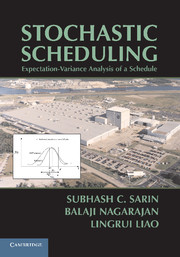Book contents
- Frontmatter
- Contents
- Foreword
- Preface
- STOCHASTIC SCHEDULING
- 1 Introduction
- 2 Robust Scheduling Approaches to Hedge against Processing Time Uncertainty
- 3 Expectation-Variance Analysis in Stochastic Multiobjective Scheduling
- 4 Single-Machine Models
- 5 Flow-Shop Models
- 6 Job-Shop Models
- 7 Parallel-Machine Models
- 8 The Case of General Processing Time Distribution
- 9 Concluding Remarks
- Appendix
- Bibliography
- Index
5 - Flow-Shop Models
Published online by Cambridge University Press: 05 July 2014
- Frontmatter
- Contents
- Foreword
- Preface
- STOCHASTIC SCHEDULING
- 1 Introduction
- 2 Robust Scheduling Approaches to Hedge against Processing Time Uncertainty
- 3 Expectation-Variance Analysis in Stochastic Multiobjective Scheduling
- 4 Single-Machine Models
- 5 Flow-Shop Models
- 6 Job-Shop Models
- 7 Parallel-Machine Models
- 8 The Case of General Processing Time Distribution
- 9 Concluding Remarks
- Appendix
- Bibliography
- Index
Summary
Introduction
In Chapter 4, different single-machine models were dealt with in detail, and now we extend our expectation-variance (EV) analysis to multimachine environments. In this chapter we focus on a flow shop with unlimited intermediate storage (buffer capacity) where n jobs are waiting to be processed. The flow shop consists of m machines. Our analysis for this environment is identical to that presented by Wilhelm and Ahmadi-Marandi (1982), who studied an assembly system. A flow shop is, in fact, a simpler version of an assembly line, and hence their methodology can be adapted to our case. The EV analysis of a flow shop would act as a stepping stone for undertaking the EV analysis for job-shop and parallel-machine environments. Numerical illustrations indicating the significance and applicability of our work are also presented through example problems. The objective function that we consider is to minimize the makespan. Makespan is an important objective in a flow shop because a lower makespan value implies higher utilization of the machines. Also, we consider permutation flow shops, in which the job sequence does not change across the machines, and the jobs on each machine are also processed according to the first come, first served principle.
- Type
- Chapter
- Information
- Stochastic SchedulingExpectation-Variance Analysis of a Schedule, pp. 66 - 72Publisher: Cambridge University PressPrint publication year: 2010

